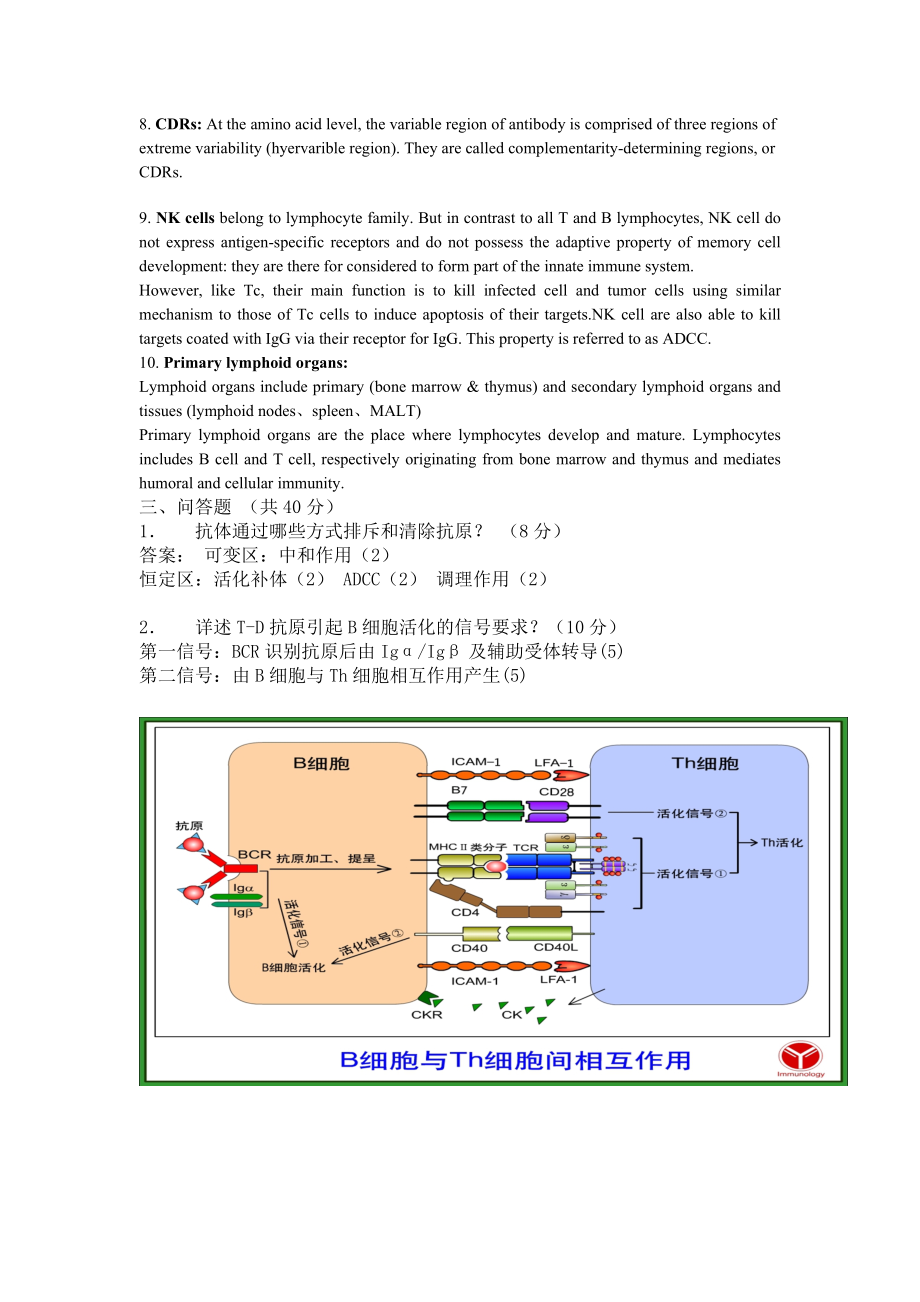




付费下载
下载本文档
版权说明:本文档由用户提供并上传,收益归属内容提供方,若内容存在侵权,请进行举报或认领
文档简介
1、苏州大学免疫学D卷 一、选择题 (共10题 每题1分)1免疫对机体 A有利 B有害 C有利又有害 D无利也无害 E正常情况下有利,某些条件下有害2宿主的天然抵抗力 A经遗传而获得 B感染病原微生物而获得 C接种菌苗或疫苗而获得 D母体的抗体(IgG)通过胎盘给婴儿而获得 E给宿主转输致敏巴细胞而获得 3.下列哪种物质本身没有免疫原性? A、非聚合可溶性抗原 B、抗体 C、补体 D、半抗原 E、细菌多糖45种免疫球蛋白的划分是根据 AH链和L链均不同 BV区不同 CL链不同 DH链不同 E连接H链的二硫键位置和数目不同 5体液补体抑制因子是 AC1q BIgG1 CIL2 DH因子 EB因子 6
2、补体 A具有相应受体 B具有抗感染作用 C经典途径成分包括C19 D体液补体抑制因子中包括H因子 E以上均正确 7具有调理作用的是 A抗原 B抗原和补体 C抗体和补体 D补体 E. 抗体 8关于细胞因子 A细胞因子是由细胞产生的 B单一细胞因子可具有多种生物学活性 C细胞因子可以自分泌和旁分泌两种方式发挥作用 D细胞因子的作用不是孤立存在的 E以上均正确 9下列英文缩写含义正确的是 AEPO-血小板生成素 BIL-白细胞介素 CSCF-肿瘤坏死因子 DTNF-集落刺激因子 ECSF-干细胞生长因子 10.NK细胞 A.能完成TCR基因的重排 B.不受IFN的影响C.杀伤效果与靶细胞表面的1类M
3、HC分子表达水平成正比D.能杀伤某些被病毒感染的细胞 E.能杀伤所有被病毒感染的细胞二、名词解释 (每题5 分,共50 分 请用英文回答)1. SAg2.adjuvants 3. ELISA 4. TSA5. TH16CD7. TLR8CDR9.NK cell10. primary lymphoid organs 三、问答题 (共40分)1 抗体通过哪些方式排斥和清除抗原? (8分)2 详述T-D抗原引起B细胞活化的信号要求?(10分)3 体液应答的一般规律和意义(12分)4 I型超敏反应的发病机制并列举出三种常见疾病。(10分)答案:一、EADDD ECEBD 二、名词解释:1Super a
4、ntigens: Some protein products of bacteria and viruses produce proteins known as super-antigens that bind to lateral surface of MHCII molecules (not in the peptide binding groove) and the V region of the b subunit of the TCR. These antigens are not processed into peptides as conventional antigens, b
5、ut are able to bind to a specific family of TCR.2. Adjuvants: nonliving vaccines, especially those consisting of small molecules require the inclusion of agents to enhance their effectiveness. These agents (adjuvants) include microbial, synthetic and endogenous preparations having adjuvant activity.
6、 3. ELISA: enzyme-linked immunoabsobant assays. Principle: Unknown Ag attached to a solid surface capture the Ab with which some special enzyme was linked. The enzyme-linked Ab will reacts with some special substrate to show special color which could be used for quantitation of unknown Ag.4. TSA (tu
7、mor specific antigens): unique to tumor cells but are rare.5. TH1: CD4 + T Helper cells (TH) are further divided into 2 main classes, TH1 and TH2, and maturation into these types is determined by the microenvironment. TH1 cells are stimulated to mature due to the presence of bacteria, viruses, fungi
8、, protozoa. They stimulate macrophage activation, and support maturation of Cytotoxic T cells. They release IL-2, IFN-Y, TNF-B, and are linked to cell mediated inflammation, and Delayed Type Hypersensitivity. Activate macrophages and cytotoxic T cells to aggressively ingest antigen and to kill inges
9、ted microbes.6CD: cell surface molecules can be recognized by particular monoclonal antibodies. All of the mAbs that react with a particular membrane molecule are grouped together as a cluster of differentiation (CD).7. Toll like receptors (TLR)Toll like receptors are a family of proteins of which t
10、here are at least 5 known members.Using TLRs, innate immune cells can detect and respond to infection by recognizing conserved motifs of microbes. TLRs transmit signals about microbial constituents to the nucleus, thus regulating the type of genes expressed, and the subsequent response.8. CDRs: At t
11、he amino acid level, the variable region of antibody is comprised of three regions of extreme variability (hyervarible region). They are called complementarity-determining regions, or CDRs.9. NK cells belong to lymphocyte family. But in contrast to all T and B lymphocytes, NK cell do not express ant
12、igen-specific receptors and do not possess the adaptive property of memory cell development: they are there for considered to form part of the innate immune system.However, like Tc, their main function is to kill infected cell and tumor cells using similar mechanism to those of Tc cells to induce ap
13、optosis of their targets.NK cell are also able to kill targets coated with IgG via their receptor for IgG. This property is referred to as ADCC.10. Primary lymphoid organs: Lymphoid organs include primary (bone marrow & thymus) and secondary lymphoid organs and tissues (lymphoid nodes、spleen、MALT)Primary lymphoid organs are the place where lymphocytes develop and mature. Lymphocytes includes B cell and T cell, respectively originating from bone marrow and thymus and mediates humoral and cellular immunity.三、问答题 (共40分)1 抗体通过哪些方式排斥和清除抗原? (8分)答案: 可变区:中和作用(2)恒定区:活化补体(2) ADCC(2) 调理作用(2)2 详述T-D抗原引
温馨提示
- 1. 本站所有资源如无特殊说明,都需要本地电脑安装OFFICE2007和PDF阅读器。图纸软件为CAD,CAXA,PROE,UG,SolidWorks等.压缩文件请下载最新的WinRAR软件解压。
- 2. 本站的文档不包含任何第三方提供的附件图纸等,如果需要附件,请联系上传者。文件的所有权益归上传用户所有。
- 3. 本站RAR压缩包中若带图纸,网页内容里面会有图纸预览,若没有图纸预览就没有图纸。
- 4. 未经权益所有人同意不得将文件中的内容挪作商业或盈利用途。
- 5. 人人文库网仅提供信息存储空间,仅对用户上传内容的表现方式做保护处理,对用户上传分享的文档内容本身不做任何修改或编辑,并不能对任何下载内容负责。
- 6. 下载文件中如有侵权或不适当内容,请与我们联系,我们立即纠正。
- 7. 本站不保证下载资源的准确性、安全性和完整性, 同时也不承担用户因使用这些下载资源对自己和他人造成任何形式的伤害或损失。
最新文档
- 2025年经济公司综合岗笔试题及答案
- 2025年安徽省人事人才网考试及答案
- 2025年中学行政事业编考试及答案
- 2026年跨越历史的春节与家族传承
- 2025年中南大学辅导员笔试题及答案
- 2025年柏乡教资笔试答案
- 2025年国企巡检岗笔试题库及答案
- 2026年人工智能算法工程师实战技能提升培训
- 2026年老旧小区改造政策落实情况分析
- 2025年公职编制笔试及答案
- 2024年钢丝绳索具相关项目创业计划书
- 幼小衔接数学计算每日一练39天(幼儿园大班)
- 基于蛋白代谢多组学探讨参麻益智方治疗高血压合并血管性痴呆大鼠作用机制演示稿件
- 上海布邦流体过滤产品知识课件
- 建筑施工人员三级安全教育
- 全国优质课一等奖职业学校教师信息化大赛《语文》(基础模块)《我愿意是急流》说课课件
- 初三寒假家长会ppt课件全面版
- 《干部履历表》1999版电子版
- 石泉县安沟钛磁铁矿矿山地质环境保护与土地复垦方案
- 成长作文500字五年级
- 血流动力学不稳定骨盆骨折急诊处理

评论
0/150
提交评论